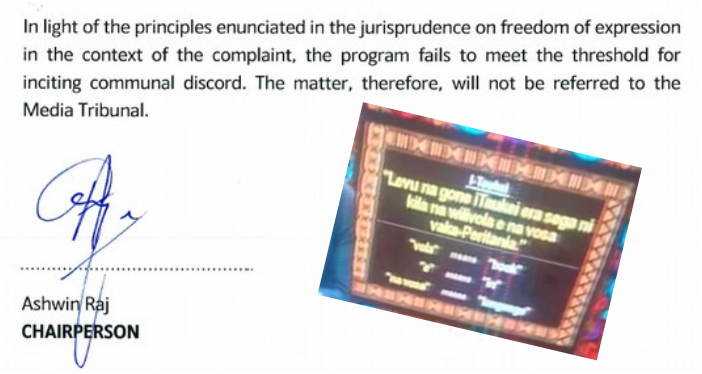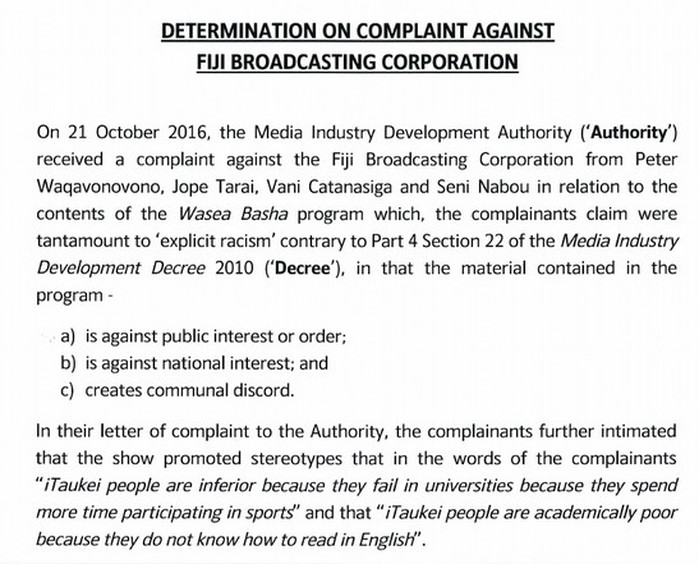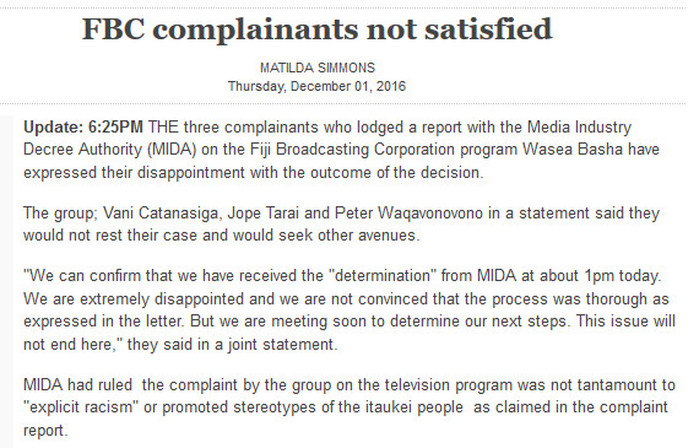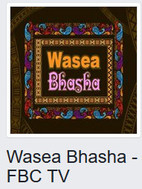Fijileaks: Bill Whatcott was charged with promoting hate after he distributed flyers that condemned gay sex as immoral. Whatcott had published and distributed four anti-gay flyers in Saskatchewan, Canada, that used words like "filth" "propaganda" and "sodomy" to describe gay relationships and discussions of equality. The Canadian Supreme Court held that the first two flyers, titled "Keep homosexuality out of Saskatoon's public schools" and "Sodomites in our public schools" did constitute hate speech. The second two flyers — photocopies of classified ads with Whatcott's handwritten comments on them stating the ads were for "men seeking boys" — the Supreme Court ruled against the Canadian Human Rights Commission (that had brought the case against Whatcott). The Supreme Court found that it was unreasonable to find the second two flyers "contain expression that a reasonable person … would find as exposing or likely to expose persons of same-sex orientation to detestation and vilification." In one of his pamphlets Whatcott claimed that children would be taught ‘how wonderful it is for two men to sodomize each other,’ saying that teachers in Ontario seemed ‘more interested in the sexual politics of a perverted type’ rather than preparing children for their adult lives. ‘The homosexuals want to share their filth and propaganda with Saskatchewan’s children,’ Whatcott wrote. ‘Our children will pay the price in disease, death, abuse and ultimately eternal judgement if we do not say no to the sodomite [sic] desire to socialize your children into accepting what is clearly wrong.’
The anti-gay campaigner fled to the Philippines last year, claiming he was forced to flee Canada over his anti-gay activism
Fijileaks to Ashwin Raj: Program is Wasea Bhasha and not Wasea Basha
Wasea Bhasha program fails to meet the threshold for inciting communal discord - MIDA
The Media Industry Development Authority says the Wasea Bhasha program fails to meet the threshold for inciting communal discord and the matter will not be referred to the Media Tribunal.
MIDA Chairman Ashwin Raj says that MIDA received a complaint against FBC from Peter Waqavonovono, Jope Tarai, Vani Catanasiga and Seini Nabou in relation to the contents of the Wasea Bhasha program which, the complainants claim were tantamount to ‘explicit racism’ contrary to the Media Industry Development Decree.
In their letter of complaint to MIDA, the complainants further intimated that the show promoted stereotypes that in the words of the complainants “Itaukei people are inferior because they fail in universities because they spend more time participating in sports” and that “Itaukei people are academically poor because they do not know how to read in English.”
Other comments on Wasea Bhasha were “some teachers drink grog whole night and come to work lazy” ; “Many Itaukei boys roam around in the night with their mobile phones, wasting time” ; and “Indo Fijian boys and girls do not roam around in the night.”
After its investigation and a response from FBC, MIDA made the determination that the content of the particular episode of the program contained generalisations and stereotypes bereft of accuracy, balance and fairness about social progress of the Itaukei community that is not only denigrating, but may also have the effect of giving credence to racist stereotyping given the power of the media.
MIDA says not only are the statements denigrating towards the Itaukei community, statement attributed to the Indo Fijian community are equally unsubstantiated.
The Authority says that the statements made on that particular Wasea Bhasha episode, saturated as it was with generalisations, is not tantamount to explicit racism.
MIDA says explicit racism is premised on hatred.
It says neither are these comments against public interest or order, against national interest nor does it have the effect of creating communal discord.
The Authority says the nature of statements made in the program lacked balance and substantiation.
It says that given the standing and ability to influence a wide spectrum of society as a public figure, responsibility lies greater on the journalist particularly given the sensitive nature of the subject matter.
However MIDA says the tone was not provocative and the language was not inflammatory. It says that there was no overt call to violence.
The Authority says a close examination of the program shows that there is no pattern of hostility towards any community.
It was also noted that the presenter and producer had offered a public apology admitting negligence, and FBC had also taken several remedial steps. Source: Fijivillage News
The Media Industry Development Authority says the Wasea Bhasha program fails to meet the threshold for inciting communal discord and the matter will not be referred to the Media Tribunal.
MIDA Chairman Ashwin Raj says that MIDA received a complaint against FBC from Peter Waqavonovono, Jope Tarai, Vani Catanasiga and Seini Nabou in relation to the contents of the Wasea Bhasha program which, the complainants claim were tantamount to ‘explicit racism’ contrary to the Media Industry Development Decree.
In their letter of complaint to MIDA, the complainants further intimated that the show promoted stereotypes that in the words of the complainants “Itaukei people are inferior because they fail in universities because they spend more time participating in sports” and that “Itaukei people are academically poor because they do not know how to read in English.”
Other comments on Wasea Bhasha were “some teachers drink grog whole night and come to work lazy” ; “Many Itaukei boys roam around in the night with their mobile phones, wasting time” ; and “Indo Fijian boys and girls do not roam around in the night.”
After its investigation and a response from FBC, MIDA made the determination that the content of the particular episode of the program contained generalisations and stereotypes bereft of accuracy, balance and fairness about social progress of the Itaukei community that is not only denigrating, but may also have the effect of giving credence to racist stereotyping given the power of the media.
MIDA says not only are the statements denigrating towards the Itaukei community, statement attributed to the Indo Fijian community are equally unsubstantiated.
The Authority says that the statements made on that particular Wasea Bhasha episode, saturated as it was with generalisations, is not tantamount to explicit racism.
MIDA says explicit racism is premised on hatred.
It says neither are these comments against public interest or order, against national interest nor does it have the effect of creating communal discord.
The Authority says the nature of statements made in the program lacked balance and substantiation.
It says that given the standing and ability to influence a wide spectrum of society as a public figure, responsibility lies greater on the journalist particularly given the sensitive nature of the subject matter.
However MIDA says the tone was not provocative and the language was not inflammatory. It says that there was no overt call to violence.
The Authority says a close examination of the program shows that there is no pattern of hostility towards any community.
It was also noted that the presenter and producer had offered a public apology admitting negligence, and FBC had also taken several remedial steps. Source: Fijivillage News







